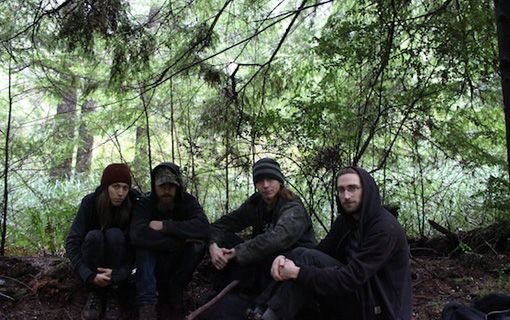
Alda, a Cascadian black metal band from Tacoma, Washington, released the new album Passage on Sept. 25. The fall season has brought us many such albums from artists with an environmental/nature focus, including Panopticon’s newest, Autumn Eternal, and Thrawsunblat’s upcoming Metachthonia. Alda has managed to distinguish themselves by creating their own sound, while still maintaining the aesthetics associated with the Cascadian movement. Passage continues that process, and is a solid followup to the 2011 release, Tahoma.
“The earth has burned black beneath our feet,” declares the vocalist on the opening track, “The Clearcut.” “Yet still beneath the coil of the withered root, there is life in the silence.” Not a band to mince words, Alda is the latest ‘green’ black metal band amongst a blossoming Pacific Northwest music scene that is lamenting the destruction done to nature. And like many of their peers, their music is an audial summons to listeners, issuing – through the sounds of a thriving counter-culture – a demand for change.
That song clocks in at about 14 minutes, with every subsequent track being at least 10 minutes in length, save for the six-minute-long instrumental piece, “The Crooked Trail.” The album takes the listener on a bracing journey through a plethora of cross-genre influence and environmental lyricism. Like Kentucky’s Panopticon, Alda incorporates cello into their new music. This, along with female singing and acoustic segues and fadeouts, help to add a delicate, melodic balance to the album, complimenting the sonic abrasion that one would associate with the black metal sound.
That there is such a music scene calling attention to the environment, especially amongst us millennials, is heartening. Recently, however, several Cascadian bands have sidestepped the allegory of their previous albums to pen songs that are lyrically more associated with primitivism or nature worship. Not so with Alda, who are continuing to draw attention to real world issues, while not entirely dropping the romanticism of their subgenre either. It’s a balancing act that pays off, and which will draw a diverse group of listeners – both the politically or environmentally minded and the forest-loving, anti-modernist retrophiles.
The term “Cascadian black metal” has long been polarizing amongst listeners, with some feeling that the term is gimmicky, and moreover that it is often misapplied when used to refer to bands like Panopticon, who hail from the Appalachian region, or Drudkh, a Ukrainian black metal band with more of a focus on rustic paganism. When asked about how they feel about the label, Alda suggested that they were not, in fact, merely jumping on a bandwagon, but that, as actual members of a community in the Cascadian part of the U.S., they took the name quite seriously. They noted, “Some outside music enthusiasts have been connecting the dots based on aesthetics and sound rather than content. One of the weird things about this, however, is that most of these artists really began this journey independent of one another, were later associated with each other, and then later became friends and collaborators, and there is definitely a tribalistic undercurrent in the relationships between some of them.”
In keeping with that notion of solidarity, the band has played benefit shows and stood up for good environmental causes, including fighting to protect their community. In June they played the Thirst for Light festival in Pee Ell, Washington, joined by bands such as Amber Asylum, Novemthree, and Ekstasis. The event was a benefit show for BARK, an environmental advocate group for Oregon’s Mt. Hood National Forest and a member of the Keep Nestle Out of the Gorge Coalition. BARK’s goal is to oppose the Nestle Corporation’s plans to privatize Oxbow Springs, a reservoir near that forest, so they can establish a water bottling plant there, which would take those pristine waters away from the public and could have severe environmental impacts. Alda remarked that it would be an example of “a multinational corporation damming up a public spring with a commerical spigot.”
It’s merely one example of Alda’s activism through music, and it’s part of their overall ideology, which is that man cannot be divorced from, or have a lack of care for, nature. “All notions of separation or dominion over nature are illusory,” said the band in an interview with CVLT Nation. “We’ve merely built a mental labyrinth to insulate our egos from the acknowledgement that impersonal natural forces both sustain us and destroy us.” (Climate change is certainly an example of the latter.) They noted that people need to get out and do something to save the planet, concluding, “There’s no true justification to lapse into lazy nihilism.”
Passage’s eponymous track, the second song on the album, clearly expresses such a sentiment, with lyrics like the following: “If the dam were to break, before the forest withers . . . ! If we were to find our way . . . before the rivers run dry!” There is certainly a sense of urgency to the music here, as if to insinuate that time, indeed, is running out. The song “Weathering,” conjuring up images of drought-ravaged areas of the U.S., makes this point nicely: “We, the parched land aching for a drink . . . When we’re cast from the shores and left to the drought . . . Finding the courage to breathe . . . To weather the storm again.”
Photo: Alda Facebook page












Comments